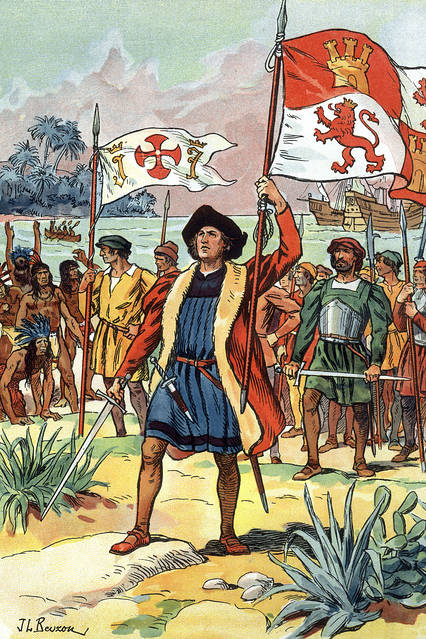Straight Talk About Christopher Columbus
December 24, 2020

This op ed. originally appeared in The Wall Street Journal on October 10, 2016.
Columbus Day used to be a celebration of the enterprising courage of Christopher Columbus and other explorers who set out into the unknown and began the long process of establishing civilization in a new part of the world.
That triumphalist account will no longer do. We think now of the extraordinary presumption of sticking a flag in someone else’s land and calling it yours. We think more darkly of how European diseases more than decimated the native peoples of the Western hemisphere. We think most darkly of the slave trade that followed European contact with what was only to the Europeans a new world.
These dark thoughts aren’t amiss. Yet when we think of them we should consider two other thoughts: what the world was like when Europeans collided with the natives of North America, and why that world no longer exists.
Europeans headed west in the 15th century to what they thought was Asia because they were blocked from going east by the great Muslim empires of the time.
In Asia, China was rich and powerful beyond anything to which Europeans could aspire. Compared with the Muslims and Chinese, the Europeans were poor, backward and weak.

The Europeans suffered as the weak always do. Terrible plagues from Asia brought by commerce devastated Europe. An estimated 100 million people died, as would many more, even as the Europeans began settling in the Western hemisphere.
Europeans also suffered from slavery. For many years, Europe’s most valuable export to the Middle East was its own people, sold as slaves by the Vikings who had conquered them and settled in to rule. The English word “slave” comes from a word still used to describe some Eastern Europeans, “Slav.” In the period from 1530 to 1780, Muslim raiders captured and enslaved an estimated one million or more Europeans.
The Europeans who conquered the Western hemisphere acted as people had always acted, no better or no worse; those they conquered suffered as the Europeans themselves had suffered.
This is evident if we look at the first European conquest outside of Europe. The Europeans began to assert themselves with the 1415 conquest of Ceuta, across the Strait of Gibraltar from Spain. They conquered Ceuta from the Muslims, which was a dreadful thing to do, as it was when successive Muslim rulers took it by force from each other, after the first of them took it from the Berbers, who had taken it from the Byzantines, who had taken it from the Vandals, who had taken it from the Romans, who had taken it from the Carthaginians, who undoubtedly took it from some others, now lost to history.
The similarity of the Europeans and those they encountered in the Western hemisphere is also clear when we remember that a relatively small number of Spaniards were able to conquer the Aztec empire in part because many of the indigenous people the Aztecs had conquered—and often sacrificed to their gods—hated the Aztecs and joined with the Spanish to fight them.
Of course, to say that Europeans acted as others had acted doesn’t justify the awful things Europeans did to each other, and to non-Europeans, in their long history. But it might persuade us to understand and moderate our condemnation of Columbus.
We judge Columbus harshly because the same power that enabled the Europeans to conquer the world also allowed them to impose their views on the world. And the views they imposed are now our views.
Even as the conquest was reaching its zenith in the 19th century, the Europeans were bringing to the world the then-novel idea that one group of people didn’t have the right to impose its will on another group.
This revolution in thinking, which ultimately undermined European imperialism, was announced by the Declaration of Independence and its assertion of the self-evident truth of human equality. It was carried further by the British who suppressed the slave trade with their all-powerful navy, commercial might and insistent diplomacy, and who led the campaign for the abolition of slavery. It was completed by American insistence after the world wars of the 20th century on the right of self-determination, the right of people to self-government.
This Columbus Day we need no triumphalism. Let it be a day instead to ponder the human capability for good and evil and wonder how we might encourage more of the good.
Mr. Tucker is a senior fellow at the Ashbrook Center at Ashland University in Ohio and the author of “Revolution and Resistance: Moral Revolution, Military Might, and the End of Empire” (Johns Hopkins University Press, 2016).

